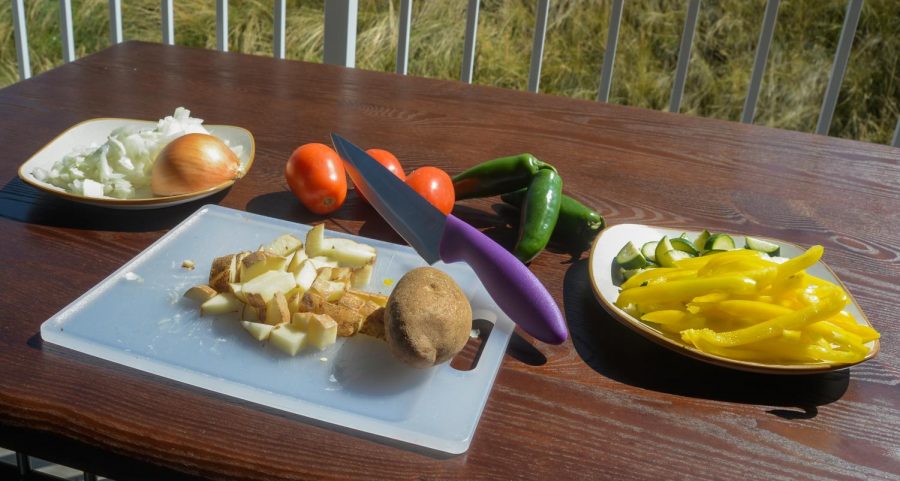Doable health habits most students can afford
Maintain those Cougar Calves while living on meager college budget without giving up valuable free time
DAVID PEDRAZA | EVERGREEN PHOTO ILLUSTRATION
While organic fruits and vegetables can break the bank, there are other options to explore when trying to add veggies to a daily meal.
August 29, 2018
We’ve all heard that living a healthy lifestyle saves you money in the end. “Investing in your health today will prevent medical expenses tomorrow,” say chimer-inners. But is that practical? How can you invest in yourself when it feels like you have no time and even less money?
Answer: Do what you can with what you have.
Right now what you have is a wealth of tips and tricks in this column, so you’re off to a great start.
Your penny-pinching health adviser today is Destiny Sternod. Sternod is a yoga instructor and the owner of Main Street Squeeze Juice & Smoothie in downtown Pullman. The WSU alumna has figured out how to stay healthy and frugal.
“I may be a business owner,” Sternod said, “but I’m definitely still living like a college student, living on a budget and trying to pay off my student loans.”
Sounds like an expert to me.
Your thrifty tips and tricks are divided here in three important categories: exercise, diet and attitude.
Exercise: Do it naked for all I care
For those of us who can’t afford yoga classes or Lululemon leggings, there’s still hope, because you don’t need a yoga class or yoga pants to do yoga. Face-to-face classes and butt-boosting fabric might be enriching, but those products are not necessary for your health. Snip, snip — cut that noise out.
Sternod suggests wearing pajamas.
“I’m a yoga instructor and I don’t spend money on workout clothes at all,” Sternod said. “Pajamas work great!”
Sternod said she started practicing yoga in her living room, watching Comcast videos. You can do the same.
Nowadays, the internet is full of yogis with soothing voices who will lead you through a yoga practice. Some practices are even designed to work on a twin-size bed. The web is also full of Army-sergeant types who will yell through your screen to run until you puke, if that’s what you need to get into it.
On that note, it’s okay to intuit what your body needs. Health is really about happiness. Not every exercise needs to be guided by an expert, just like not every Toyota Corolla sing-along needs a choir director.
Whether it’s physical education or product placement that teaches us this, many college students seem to feel like their exercise needs to be structured or paid for to even count. That’s just not true.
You can run until you feel good, stretch without naming the pose or fist-pump until your arm flab jiggles in time with Kanye’s jams. Your body is your own. Move it how you like.
Diet: budgets, bulk and broccoli with your pasta
When it comes to your food, you probably can’t swing it for free like you can with exercise. So make your new mantra “budget, budget, budget.” Once you’ve figured out how much you can afford to spend, Sternod has a trick to help you stick to your budge and make the most of that money.
Sternod said she and her smoothie-blending husband, Jason Vanworkum, take out about $100 in cash at the beginning of the week for the two of them and head directly to WinCo. She said they don’t spend anything else on food in a week.
Sternod said restricting their food funds to cold hard cash helps them keep track of how much they spend.
“When you’re using your card you don’t think about it a lot,” she said. “You spend $5 here, $5 there. Having cash in your hand is different from swiping a card.”
Once you’ve got your paper dollars in hand, Sternod said WinCo is the spot to go for cheap, quality produce.
The joys of WinCo don’t stop there. This fluorescent-lit oasis offers a ton of bulk food. Buying bulk will save you big bucks.
For example, if you buy a protein bar on campus every day — say a $1.70 Clif Bar — you’ll spend $30 in 18 days. A pack of 18 Clif Bars on Amazon would cost you nearly half that at about $16. And the bulk rule applies to most foods.
If you shudder at the word “budget” and want to start with the absolute quickest, easiest way to add some nutritional value to your diet, look no further than frozen veggies.
You can get frozen vegetables cheap. They don’t require chopping time or counter space and they’re full of nutrients. Just toss some complementary garden goods into whatever you’re already eating.
Quick swap-outs never hurt either. Your body will thank you for switching soda to water and processed sugary snacks to fruit.
Attitude: Have a positive one and don’t judge, even yourself
Sternod said it’s important not to set a one-size-fits-all standard.
Not everybody has the time to prepare vegan meals. Not everybody has the lung capacity to run up and down crazy Pullman hills like a dog off its leash.
Sternod said while there are ways to save money on good food, it’s important to keep an open mind.
“In a lot of ways the vegan community has failed lower income families by suggesting that it’s super easy and inexpensive, when it really does take time and not everyone has time,” Sternod said. “It’s so important to come at it from a place of non-judgment and understanding, and to look at the bigger picture.”
It’s important to keep this in mind. Don’t judge others, and don’t judge yourself. Baby steps count. Why get down on yourself for failing to reach an imaginary finish line?
The goal of a healthy lifestyle is a happy life. If you’re happy when you do it, you’ve already won. Get your blood flowing for as long as you have, even five minutes. Eat the fruits and veggies you enjoy and can afford. Do what you can with what you have.










